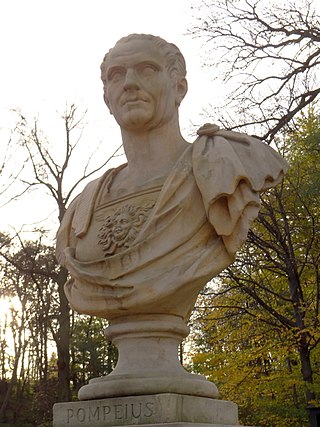Related Research Articles
Year 43 BC was either a common year starting on Sunday, Monday or Tuesday or a leap year starting on Sunday or Monday of the Julian calendar and a common year starting on Monday of the Proleptic Julian calendar. At the time, it was known as the Year of the Consulship of Pansa and Hirtius. The denomination 43 BC for this year has been used since the early medieval period, when the Anno Domini calendar era became the prevalent method in Europe for naming years.

This article concerns the period 59 BC – 50 BC.

Year 58 BC was a year of the pre-Julian Roman calendar. At the time, it was known as the Year of the Consulship of Piso and Gabinius. The denomination 58 BC for this year has been used since the early medieval period, when the Anno Domini calendar era became the prevalent method in Europe for naming years.
Aulus Gabinius was a politician and general of the Roman Republic. He had an important career, culminating with a consulship in 58 BC, mainly thanks to the patronage of Pompey. His name is mostly associated with the lex Gabinia, a law he passed as tribune of the plebs in 67 BC that granted Pompey an extraordinary command in the Mediterranean Sea to fight the pirates.
The gens Gabinia was a plebeian family at ancient Rome. Members of this gens first appear in the second century BC. The nomen derives from the city of Gabii, east of Rome.

The gens Manlia was one of the oldest and noblest patrician houses at Rome, from the earliest days of the Republic until imperial times. The first of the gens to obtain the consulship was Gnaeus Manlius Cincinnatus, consul in 480 BC, and for nearly five centuries its members frequently held the most important magistracies. Many of them were distinguished statesmen and generals, and a number of prominent individuals under the Empire claimed the illustrious Manlii among their ancestors.

The gens Licinia was a celebrated plebeian family at ancient Rome, which appears from the earliest days of the Republic until imperial times, and which eventually obtained the imperial dignity. The first of the gens to obtain the consulship was Gaius Licinius Calvus Stolo, who, as tribune of the plebs from 376 to 367 BC, prevented the election of any of the annual magistrates, until the patricians acquiesced to the passage of the lex Licinia Sextia, or Licinian Rogations. This law, named for Licinius and his colleague, Lucius Sextius, opened the consulship for the first time to the plebeians. Licinius himself was subsequently elected consul in 364 and 361 BC, and from this time, the Licinii became one of the most illustrious gentes in the Republic.

The gens Pompeia was a plebeian family at ancient Rome, first appearing in history during the second century BC, and frequently occupying the highest offices of the Roman state from then until imperial times. The first of the Pompeii to obtain the consulship was Quintus Pompeius in 141 BC, but by far the most illustrious of the gens was Gnaeus Pompeius, surnamed Magnus, a distinguished general under the dictator Sulla, who became a member of the First Triumvirate, together with Caesar and Crassus. After the death of Crassus, the rivalry between Caesar and Pompeius led to the Civil War, one of the defining events of the final years of the Roman Republic.

The gens Cornelia was one of the greatest patrician houses at ancient Rome. For more than seven hundred years, from the early decades of the Republic to the third century AD, the Cornelii produced more eminent statesmen and generals than any other gens. At least seventy-five consuls under the Republic were members of this family, beginning with Servius Cornelius Maluginensis in 485 BC. Together with the Aemilii, Claudii, Fabii, Manlii, and Valerii, the Cornelii were almost certainly numbered among the gentes maiores, the most important and powerful families of Rome, who for centuries dominated the Republican magistracies. All of the major branches of the Cornelian gens were patrician, but there were also plebeian Cornelii, at least some of whom were descended from freedmen.

The gens Calpurnia was a plebeian family at ancient Rome, which first appears in history during the third century BC. The first of the gens to obtain the consulship was Gaius Calpurnius Piso in 180 BC, but from this time their consulships were very frequent, and the family of the Pisones became one of the most illustrious in the Roman state. Two important pieces of Republican legislation, the lex Calpurnia of 149 BC and lex Acilia Calpurnia of 67 BC were passed by members of the gens.
The gens Terentia was a plebeian family at ancient Rome. Dionysius mentions a Gaius Terentius Arsa, tribune of the plebs in 462 BC, but Livy calls him Terentilius, and from inscriptions this would seem to be a separate gens. No other Terentii appear in history until the time of the Second Punic War. Gaius Terentius Varro, one of the Roman commanders at the Battle of Cannae in 216 BC, was the first to hold the consulship. Members of this family are found as late as the third century AD.

The gens Sempronia was one of the most ancient and noble houses of ancient Rome. Although the oldest branch of this gens was patrician, with Aulus Sempronius Atratinus obtaining the consulship in 497 BC, the thirteenth year of the Republic, but from the time of the Samnite Wars onward, most if not all of the Sempronii appearing in history were plebeians. Although the Sempronii were illustrious under the Republic, few of them attained any importance or notice in imperial times.
Quintus Pompeius was the name of various Romans from the gens Pompeia, who were of plebeian status. They lived during the Roman Republic and Roman Empire.
Lucius Calpurnius Piso Frugi was a Roman politician and historian. He created the first permanent jury court in Rome to try cases related to provincial corruption during his plebeian tribunate in 146 BC. He also fought, not entirely successfully, in the First Servile War. He was consul in 133 BC and censor in 120 BC.
Gnaeus Calpurnius Piso was a high ranking Roman aristocrat and senator. He was firmly traditionalist and opposed the populist First Triumvirate, and later Julius Caesar. He fought against Caesar in the Caesar's civil war and against his adopted son, Octavian, in the Liberators' civil war; both times on the losing side.
The gens Manilia was a plebeian family at ancient Rome. Members of this gens are frequently confused with the Manlii, Mallii, and Mamilii. Several of the Manilii were distinguished in the service of the Republic, with Manius Manilius obtaining the consulship in 149 BC; but the family itself remained small and relatively unimportant.

The gens Munatia was a plebeian family at Rome. Members of this gens are first mentioned during the second century BC, but they did not obtain any of the higher offices of the Roman state until imperial times.
Gaius Cornelius was a politician during the late Roman Republic. He is most famous for serving as tribune of the plebs in 67 BC.
References
- 1 2 3 Badian 2015.
- ↑ Brut. 68; Plut, Pomp. 25, 27; Dion Cass. xxxvi. 7, 20—22 ; Ascon. in Cic. Cornel, pp. 68, 75, ed. Orelli ; Cic. ad Att. i. 1,13, pro Place. 39; Sail. Cat. 49.
Bibliography
- Badian, Ernst (2015). "Calpurnius Piso (1), Gaius, Roman consul, 67 BCE". Oxford Research Encyclopedia of Classics. doi:10.1093/acrefore/9780199381135.013.1303. ISBN 9780199381135.
 This article incorporates text from a publication now in the public domain : Smith, William, ed. (1870). "Piso (17)". Dictionary of Greek and Roman Biography and Mythology . Vol. 3. p. 374.
This article incorporates text from a publication now in the public domain : Smith, William, ed. (1870). "Piso (17)". Dictionary of Greek and Roman Biography and Mythology . Vol. 3. p. 374.